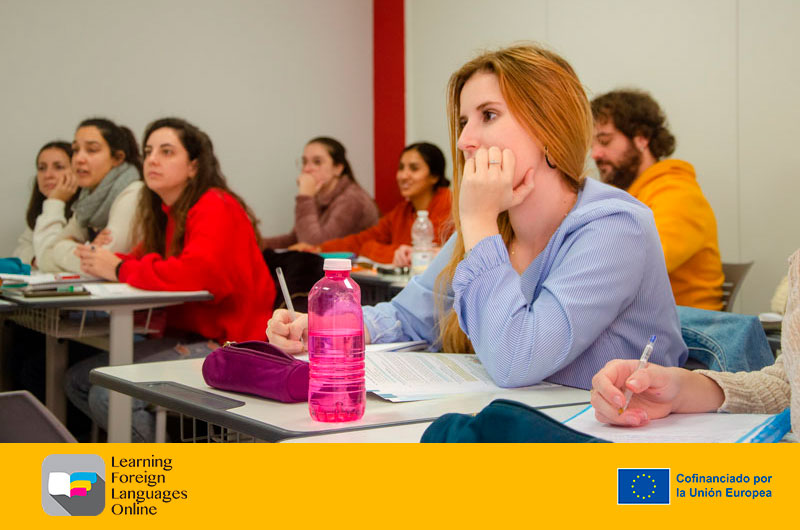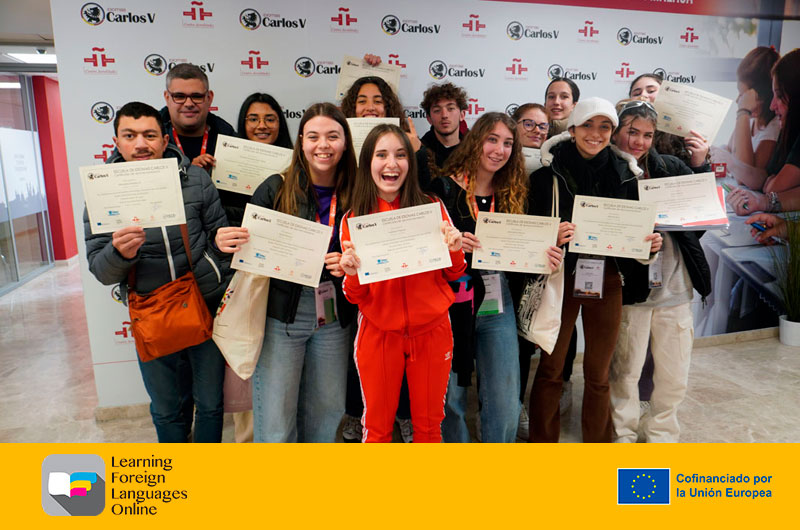En Idiomas Carlos V y Learning Foreign Languages Online sabemos la importancia del empujón que hace falta para lanzarte a aprender. En este artículo te explicamos qué factor juegan los diferentes tipos de inteligencia, las emociones y la creatividad. En esta iniciativa conjunta queremos acercarte a ti, como alumno de idiomas, al proceso de aprendizaje.
El componente emocional en el aprendizaje de lenguas extranjeras
A lo largo del proceso de la enseñanza de lenguas extranjeras en muchos países se ha favorecido el estudio memorístico, privilegiando la adquisición del conocimiento a través de un proceso donde la gestión de las emociones y la creatividad quedaban relegadas a un segundo plano. Se creía también que el proceso de evaluación única y memorística era lo más importante, el estudiante era un ente pasivo y su participación en la clase era poca o nula pues el centro de todo el proceso era el docente.
Hoy en día, diferentes estudios demuestran que el componente emocional juega un papel muy importante en el aprendizaje. La motivación hacia la asignatura e incluso la conexión entre
profesor y alumno son esenciales. Se hace necesario comprender que los estudiantes pueden aprender de diferentes formas y que tienen incluso diferentes tipos de inteligencia y por tanto
deben emplearse un abanico de herramientas dentro del aula para hacer más efectivo el aprendizaje. Esta teoría ha tenido durante los últimos años mayor difusión y una mayor acogida también entre los profesores.
Distintas teorías apoyan las anteriores afirmaciones, por ejemplo, la teoría de las inteligencias múltiples, que fue propuesta por el psicólogo estadounidense Howard Gardner como
contrapeso al paradigma de una inteligencia única. El teórico propuso que la vida humana requiere del desarrollo de varios tipos de inteligencia, él y sus colaboradores advirtieron que la inteligencia no es un factor decisivo para conocer la inteligencia de una persona. Un buen ejemplo de esta idea se refiere a personas que, a pesar de obtener buenas calificaciones
académicas, presentan problemas importantes para relacionarse con otras personas o para manejar su vida social.
La teoría de las inteligencias múltiples nos da luces para llevar a cabo diferentes actividades enfocadas al tipo de inteligencia que cada estudiante tiene.
Gardner expone que hay 8 tipos de inteligencia
- Inteligencia lógico-matemática: alta capacidad para el cálculo, la abstracción.
- Inteligencia lingüístico verbal: Las personas con ese tipo de inteligencia poseen una habilidad especial para lectura, el habla, la escritura y la escucha activa.
- Inteligencia espacial: Pueden percibir con mucho detalle aspectos visuales, crear imágenes mentales o pintar y dibujar.
- Inteligencia musical: presente en personas que componen o hacen música.
- Inteligencia kinestésico-corporal: los que más desarrollada la tienen poseen gran equilibrio, flexibilidad, coordinación ojo-mano y rapidez.
- Inteligencia intrapersonal: definida como el conjunto de habilidades que nos capacita para formarnos una imagen de nosotros mismos ajustada a la realidad y para reconocer y gestionar nuestro mundo emocional.
- Inteligencia interpersonal: Las personas con alta inteligencia interpersonal tienen facilidad para entender los sentimientos e intenciones de los demás, incluso aunque
no lo muestren abiertamente. Eso les permite ayudar a los demás. - Inteligencia naturalista: aquellas personas capaces de ver las relaciones entre especies y grupos de objetos e individuos, aunque reconozcan también las diferencias o semejanzas entre ellos.
De acuerdo a esto las clases pueden estar enfocadas en la creación y uso de materiales dirigidos a cada grupo específico de estudiantes a fin de mantenerlos motivados y activos, este
es uno de los aspectos a tener en cuenta, sin embargo, otro ejemplo relacionado con la importancia de las emociones y su correcto manejo dentro del aula es la teoría de la inteligencia emocional expuesta por Daniel Goleman en el año 1997 que afirma que la inteligencia emocional es la capacidad de reconocer las emociones – tanto propias como ajenas – y de gestionar nuestra respuesta ante ellas. Se puede definir como el conjunto de habilidades que permiten una mayor adaptabilidad de la persona ante los cambios. En este sentido, es importante mencionar que la gestión de las emociones en el aula es muy importante, un ejemplo de ello, es el manejo de aspectos negativos que como la frustración o la desmotivación pueden generar barreras difíciles de derribar en el aprendizaje.
De acuerdo a esto las clases pueden estar enfocadas en la creación y uso de materiales dirigidos a cada grupo específico de estudiantes a fin de mantenerlos motivados y activos, este es uno de los aspectos a tener en cuenta, sin embargo, otro ejemplo relacionado con la importancia de las emociones y su correcto manejo dentro del aula es la teoría de la inteligencia emocional expuesta por Daniel Goleman en el año 1997 que afirma que la inteligencia emocional es la capacidad de reconocer las emociones – tanto propias como ajenas – y de gestionar nuestra respuesta ante ellas. Se puede definir como el conjunto de habilidades que permiten una mayor adaptabilidad de la persona ante los cambios. En este sentido, es importante mencionar que la gestión de las emociones en el aula es muy importante, un ejemplo de ello, es el manejo de aspectos negativos que como la frustración o la desmotivación pueden generar barreras difíciles de derribar en el aprendizaje.
Es fundamental lograr el equilibrio de los estudiantes en la clase. Al lograr un clima positivo, sano y afectuoso se obtendrán mayores y mejores resultados pues el estudiante responderá mejor tanto a los estímulos que se le presenten en clase como al reto que implica aprender algo nuevo y su actividad cerebral aumentará.
En lo referente al estudio de lengua extranjeras hay investigaciones muy sólidas. El teórico estadounidense Stephen Krashen desarrolló en 1983 una teoría conocida como el Filtro Afectivo. Dicha teoría insiste en que el alumno va a aprender de manera más eficaz si no siente tensión o ansiedad durante el proceso de aprendizaje.
TRES EMOCIONES QUE HACEN LA DIFERENCIA
Es interesante explorar el campo de la psicología y las emociones para comprender cómo influyen en el aprendizaje. Las emociones más vinculadas con el proceso de adquisición del conocimiento son: la felicidad, el miedo, la tristeza y el amor.
La felicidad es una de las emociones más poderosas pues ayuda a reprimir sentimientos negativos. La felicidad genera motivación y un sentimiento de logro. Un estudiante feliz está
más receptivo y abierto a la adquisición de conocimientos. Este sentimiento está directamente vinculado al logro de objetivos.
El miedo por su parte, genera ansiedad y esta a su vez hace que se produzcan bloqueos en la capacidad de reacción y las respuestas. En el caso del aprendizaje genera lo que conocemos
popularmente como” quedarse en blanco” bien cuando existen dinámicas en clase de expresión oral o audiciones. Lo cual hace que tanto el componente lingüístico como el comunicativo no se desarrollen.
La tristeza hace que no haya energía, en este sentido el estudiante estará adormecido y su cerebro cada vez menos activo. En estados de tristeza se imposibilita pensar y prestar atención enfocándose en una tarea puede parecer una tarea imposible. En este caso, deben hacerse actividades para incrementar el nivel de energía y hacer que los estudiantes “se activen”.
Finalmente, el amor contribuye a generar un clima agradable, seguro, comprensivo y tierno. Es en este punto donde la relación entre los estudiantes y el profesor juega un papel fundamental
pues el estudiante reaccionará más positivamente a los diferentes retos y solicitudes que se le planteen en clase y se involucrará más fácilmente en las actividades. En este punto también cabe rescatar que la correcta gestión de estas emociones es benéfica para el profesor pues el compromiso, motivación e incluso la energía en cada una de las actividades se incrementarán en la medida en que haya un ambiente agradable en clase donde se promuevan las emociones positivas en lugar de las negativas.
CONCLUSIÓN
Favorecer las interacciones y emociones positivas en el aula no solo favorecerá un clima agradable, si no la eliminación de sentimientos negativos, la activación del cerebro y la predisposición a aprender. La cercanía siempre favorece que haya más disposición a la negociación, a la escucha activa, a la comunicación y a la producción verbal. Por ello es importante tener en cuenta que un buen estudiante no se puede medir exclusivamente por los resultados de un examen memorístico, o por una clase con actividades repetitivas donde el estudiante no muestre interés pues influyen muchos factores como su tipo de inteligencia, su motivación e incluso las cargas que traiga desde casa o situaciones externas que comprometan su motivación a la hora de aprender. En cualquier tipo de aprendizaje bien sea presencial u online será importante generar suficientes recursos que faciliten una variedad de experiencias para el estudiante.
Ángela Enríquez, profesora de Español en Escuela de Idiomas Carlos V – Centro Acreditado por el Instituto Cervantes








